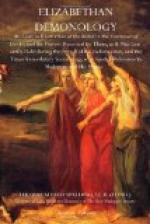“Not mad, but bound
more than a madman is,
Shut up in prison, kept without
my food,
Whipped and tormented,"[1]
if an exaggerated description of his own mental condition is in itself no inflated metaphor.
[Footnote 1: I. ii. 55.]
74. Shakspere, in “The Comedy of Errors,” and indirectly also in “Twelfth Night,” has given us intentionally ridiculous illustrations of scenes which he had not improbably witnessed, in the country at any rate, and which bring vividly before us the absurdity of the methods of diagnosis and treatment usually adopted:—
Courtesan. How say you now? is not your husband mad?
Adriana. His incivility confirms no less. Good doctor Pinch, you are a conjurer; Establish him in his true sense again, And I will please you what you will demand.
Luciana. Alas! how fiery and how sharp he looks!
Courtesan. Mark how he trembles in his extasy!
Pinch. Give me your hand, and let me feel your pulse.[1]
Ant. E. There is my hand, and let it feel your ear.
Pinch. I charge thee, Satan, housed within this man, To yield possession to my holy prayers, And to thy state of darkness his thee straight; I conjure thee by all the saints in heaven.
Ant. E. Peace, doting wizard, peace; I am not mad.
Pinch. O that thou wert not, poor distressed soul![2]
After some further business, Pinch pronounces his opinion:
“Mistress, both man
and master are possessed;
I know it by their pale and
deadly looks:
They must be bound, and laid
in some dark room."[3]
But “good doctor Pinch” seems to have been mild even to feebleness in his conjuration; many of his brethren in art had much more effective formulae. It seems that devils were peculiarly sensitive to any opprobrious epithets that chanced to be bestowed upon them. The skilful exorcist took advantage of this weakness, and, if he could only manage to keep up a flow of uncomplimentary remarks sufficiently long and offensive, the unfortunate spirit became embarrassed, restless, agitated, and finally took to flight. Here is a specimen of the “nicknames” which had so potent an effect, if Harsnet is to be credited:—




